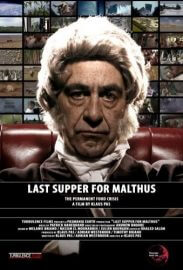
https://www.filmplatform.net/product/last-supper-malthus
With 1 billion of the world’s population going to bed hungry, Last Supper For Malthus sheds light on one of the most prevalent and alarming issues of our time, the global food crisis. The film goes beyond focusing on some of the most controversial issues today including changing diets, climate change and the use food for fuel, and considers the effects of the worst global economic crisis seen in over 80 years. A leading and up-to-date reference work on the food crisis, “Last Supper For Malthus” is unique it its presentation of long-term feasible solutions.

With 1 billion of the world’s population going to bed hungry at night, documentary film, “Last Supper For Malthus” sheds light on one of the most prevalent and alarming issues of our time, the global food crisis.
Director, Klaus Pas, brings to life political-economists Thomas Malthus and David Ricardo, intertwining their theories with gripping images and interviews from some of the world’s leading experts on the topic from all corners of the globe, including figures such as U.N. Secretary General, Ban Ki-moon, Nobel Peace Prize Winner, Dr. Rajendra Pachauri, Dr. Jacques Diouf, Jean Ziegler, Olivier de Schutter and Donald Coxe.
The film goes beyond focusing on some of the most controversial issues today including changing diets, climate change and the use food for fuel, and considers the effects of the worst global economic crisis seen in over 80 years.
A leading and up-to-date reference work on the food crisis, “Last Supper For Malthus” is unique it its presentation of long-term feasible solutions, and can be seen as more than a movie, but a tool in solving what has been deemed by many as the ‘Permanent Food Crisis.